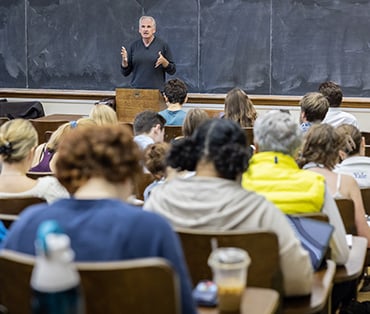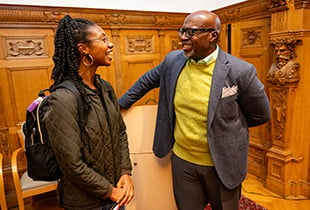How Top Schools Invest In Student Success
THIS GUIDE IS NO LONGER ACTIVE. For the current FP Guide, click here.
Yale University, Jackson School of Global Affairs
A Tailored Curriculum and Real-World Mentors Empower Students
 There is a reason why the students who enroll in the two-year program at Yale University’s Jackson School of Global Affairs have several years of work experience. “We look for people who are self-directed and entrepreneurial,” says Asha Rangappa, the school’s assistant dean of admissions, “because they’ve been on the ground, have a clear idea of where they are, where they want to go, and the delta between those points.”
There is a reason why the students who enroll in the two-year program at Yale University’s Jackson School of Global Affairs have several years of work experience. “We look for people who are self-directed and entrepreneurial,” says Asha Rangappa, the school’s assistant dean of admissions, “because they’ve been on the ground, have a clear idea of where they are, where they want to go, and the delta between those points.”
Accordingly, the Master in Public Policy in Global Affairs (MPP) has just four required core courses, to which students add other Jackson School courses; beyond those, students can choose from courses offered across the university in subjects ranging from business to law to public health. This cross-pollination, Rangappa says, enables students “to build their own toolkit for the area and career they want, while having access to the best expertise and scholars at Yale.”
But they are not flying solo. Because each Jackson class is small, at roughly 35 students, “they get to know each other and bond closely,” Rangappa says. They also receive individualized counseling from deans who help them design their curricula and prepare for careers, which includes choosing a required graduate summer internship with a company, nongovernmental organization, or government agency. “The summer experience allows students to get hands-on, practical experience in whatever policy area they choose,” Rangappa explains.

“The idea is to break down silos between academic disciplines, understanding that global challenges span different areas and students can benefit by cross-pollinating with those areas.” –Asha Rangappa, Assistant Dean of Admissions, Jackson School of Global Affairs, Yale University
In addition, the school brings on Senior Fellows, real-world practitioners who mentor students and teach classes. “Our Senior Fellows have included [retired US Army Gen.] Stan McChrystal, a senior member of the World Bank, a UN Climate envoy — people who’ve done things our students hope to do,” Rangappa says. The school also hosts 16 World Fellows each year, who are movers and shakers from around the globe and spend four months in residence in New Haven, Connecticut. Past fellows include the late Russian opposition leader Alexei Navalny, and Rema Rajeshwari, the first female superintendent of the Indian Police Service.
Over the past three years, 100 percent of Jackson’s graduates have either enrolled in further study or found employment at prestigious organizations within six months. The university’s alumni network — 187,900 members in 160 countries — continues to provide both support and global networking after graduation that help facilitate student success.
Whatever route they choose, graduates have benefited from MPP’s evidence- and ethics-based curriculum. Jackson graduates, Rangappa says, “must move nimbly between different perspectives and disciplines. They must understand economics, history, political systems, and languages. We’re helping them become global citizens.”
Multiple Funding and Job Opportunities Provide Support
Focused on making its Master in Public Policy program accessible, the Jackson School guarantees 100 percent coverage of tuition for every student who requests and qualifies for financial aid. This past year, that translated into an average of $68,000 per student in merit-based scholarships. Half of each cohort also receives a full cost-of-living stipend, meaning the entire cost of attendance is covered.
The Jackson School also offers students paid teaching and research opportunities, and up to $6,000 for its required graduate summer experience, which students use to pursue internships and research projects.
Yale University, Jackson School of Global Affairs
https://jackson.yale.edu
[email protected]
203-432-6253![]()
Contents
- How Top Schools Invest In Student Success
- George Washington University, Elliott School of International Affairs
- Rice University, School of Social Sciences
- Princeton University, Princeton School of Public and International Affairs
- Augusta University, Pamplin College of Arts, Humanities, and Social Sciences
- The Fletcher School at Tufts University
- Indiana University, Hamilton Lugar School of Global and International Studies
- Columbia University, School of International and Public Affairs
- Penn State University, School of International Affairs
- Texas A&M University, Bush School of Government & Public Service
- Georgetown University, School of Foreign Service
- University of Denver, Josef Korbel School of International Studies
- Yale University, Jackson School of Global Affairs
- George Mason University, Schar School of Policy and Government
- American University, School of International Service
- Seton Hall University, School of Diplomacy and International Relations
- Johns Hopkins University School of Advanced International Studies


